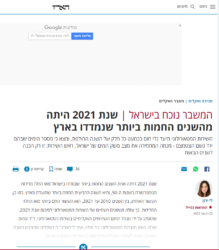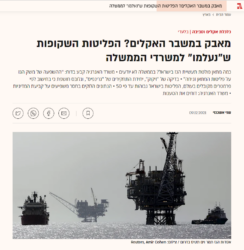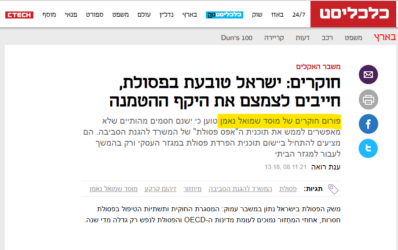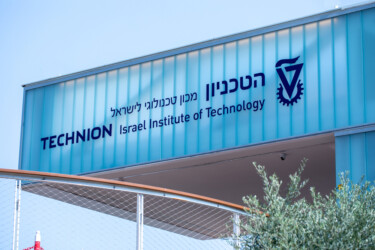Connect to schedule an interview
+972.4.829.2329
Neaman in the media
The Climate Crisis Has Not Skipped Israel: 2021 Fourth-hottest Year on Record
The Meteorological Service recorded and found that the number of days with rainfall dropped.
When the same amount of rain falls in shorter bursts, more of it is lost rather than absorbed into the groundwater, and there is more flooding and property damage, explained Prof. Ofira Ayalon of Haifa University and the Samuel Neaman Institute for National Policy Research Institute at the Technion.
The demands on Israel’s EV charging infrastructure
Idan Liebes
Idan Liebes, Energy and Smart Mobility Policy Researcher at The Samuel Neaman Institute for National Policy Research, discusses Israel’s EV charging infrastructure and the challenges in meeting the exponential growth in EV charging demands.
Fighting the climate crisis? The transparent emissions that have “disappeared” from the government’s eyes
Ofira Ayalon, Miriam Lev-On, Perry Lev-On, Naama Shapira
How much methane does the gas industry emit in Israel?
The government doesn’t know.
The Ministry of Energy stated in its report: “The impact of the gas sector on methane emissions is negligible”
Contrary to the recommendations of the Samuel Neaman Institute Report, there is no comprehensive and reliable collection of emissions data in Israel.
An interview with Prof. Ofira Ayalon on “KAN”: Managing wastes correctly
An interview with Prof. Ofira Ayalon, Senior Researcher at Samuel Neaman Institute at the Technion, and environmental policy researcher at University of Haifa: On the need for a proper waste management, and better coordination between the Ministry of Environmental Protection and the local authorities
Israel drowns in waste, landfill must be reduced
A forum of researchers from Samuel Neaman Institute and the University of Haifa argues that there are fundamental barriers that do not allow the implementation of the Ministry of Environmental Protection’s “zero waste” program and propose to begin implementing a waste separation plan in the business sector first and in the home sector later, while developing facilities to treat the sorted waste
An interview with Prof. Ofira Ayalon by Dalik Wollinitz: Is it still possible to contain the climate crisis?
An interview with Prof. Ofira Ayalon, Senior Researcher at Samuel Neaman Institute at the Technion, and environmental policy researcher at University of Haifa, on the trillions of dollar question: is it still possible to contain the climate crisis?
Is Israel ready to switch to renewable energies?
Prof. Ofira Ayalon, Senior Researcher at Samuel Neaman Institute at the Technion, and the University of Haifa, explains the challenges, problems, and progress that Israel has made so far and how our lives will look like with 100% renewable energies.
The new taxation on the disposable plastic utensils. Interview with Prof. Ofira Ayalon at Galaz
An interview with Prof. Ofira Ayalon, Senior Researcher at Samuel Neaman Institute at the Technion, and environmental policy researcher at University of Haifa, on the expected doubling of the prices of disposable plastic utensils cutlery with the new taxation.
The bottom line is that this tax will minimize a small amount of the waste and therefore, it will be another economic burden.
Link to the full interview in Galaz – The interview with Prof. Ofira Ayalon starts at 21:46.
Carmel Tunnels – from the British Mandate to the public protest
The idea of a tunnel crossing the Carmel arose since the British Mandate ruled the country. Decades later, along with reduced travel times, countless allegations have been made against the company that operates the Carmel Tunnels.
A Research made by Samuel Neaman institute and “EcoFinance”, found that since the opening of the tunnels, there has been a 40 percent drop in transportation loads during peak hours on major arteries, along with savings of about six million liters of fuel annually, reduced air pollution and a positive significant change in air quality.






